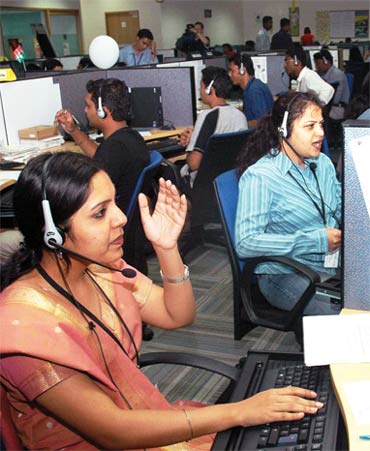
'Offshoring' is no longer a dirty word in Europe, where businesses are being forced to look at bottom lines in a new era of sluggish domestic growth and globalisation.
In fact, the biggest challenge that Indian information technology companies face in Europe today is that their global competitors like IBM and Accenture are increasingly being pressured to offshore in India by their clients.
"The scene is changing very quickly," explains Ali Toure, co-founder and Director of Quantum Step, the first and only IT outsourcing advisory company based in Europe that focuses on offshoring to India.
. . .

"Look at any of the big companies, whether BMW or Daimler, and they are increasingly asking their IT vendors to offshore at least 50 per cent or more of their operations."
Ironically, he says, the resistance is not from the clients any more, as much as from the global IT firms, for whom offshoring in India spells less profit.
Then & now
In the past, European companies were known to be notoriously suspicious of outsourcing, preferring to keep all major functions inhouse, including IT.
With strong trade unions that tended to equate even outsourcing, leave alone offshoring, with a loss of jobs, Quantum Leap estimates that even today, only some 10 per cent of the continental European IT market is being outsourced strategically.
. . .

"Companies may outsource on a piecemeal basis, but this leads to a horrendous cost for external contractors. It's only now that we are finally seeing a trend beyond body shopping, where you have a company hire five or 10 people for a week for some small job, to strategic outsourcing in the long term," says Toure.
He points to the recent three-year offshoring deal between Mahindra Satyam and BASF, the German chemical heavyweight, as an example.
Traditionally, despite being operationally globalised, companies like BASF have tended to deal with all IT functions inhouse, employing upwards of 20,000 people to do so.
The latest European mammoth to join the offshoring trend is the world's largest steel maker, ArcelorMittal. Quantum Step is the advisory firm involved in what is pegged as one of Europe's largest IT deals, estimated to be worth around $600 million.
. . .

Toure is, therefore, tightlipped on the matter but confirms that bidding for the project, involving consolidation of the steel maker's IT infrastructure across Europe, has been intense.
Sources say it's highly likely that global major Computer Sciences Corporation will win out over Indian firms such as HCLand Wipro to bag the contract, although no official confirmation has been made.
One reason the sources give is CSE's large presence in India, where they employ upwards of 25,000 people.
CSE can, therefore, bring the cost advantages of offshoring to their clients, while simultaneously enjoying a greater cultural and geographical proximity to companies in Europe.
. . .

Indian marketing lag
But Toure says European firms are, in fact, increasingly interested in hearing about offshoring from Indian faces, rather than European ones, belying the conventional wisdom that had, till now, led many Indian companies to hire European employees to head their sales operations.
Nonetheless, Indian companies remain at a disadvantage compared to global ones, in part because of what Toure calls their 'sales approach'.
"Europe is very relationship oriented and building long-term networks is vital. But the sales strategy of most Indian firms is simply to cold-call potential clients repetitively. What they need is less push and more pull," he smiles.
. . .

It's tough getting Indian companies to change their ways.
Given that they still enjoy 30-40 per cent margins, they often don't feel the need to do anything differently.
Quantum Step says this is the wrong way to tackle Europe.
For Indian firms, it explains, this part of the world could represent a massive growth area.
The European market only accounts for about 20-25 per cent of India's total IT export revenues. France, Germany, Belgium and the Nordic countries are the places to watch, says Toure.
In the two years of Quantum Step's existence, it has helped conclude some 20 deals, the vast majority of which have been with Indian companies.
. . .

"In some ways, we are a barometer for the industry," Toure quips.
"If we are growing, you can tell that the market is growing for India."
For 2011, Quantum Step predicts a mostly positive outlook, with a 'few big deals' in the offing. Toure cautions, however, that by European standards, a 'big deal' equates something in the Euro50 million region.
Moreover, many of these deals may never enter public knowledge, because European clients sometimes hire Indian companies through local partners, rather than directly.
This allows them to distance themselves from the 'outsourcing' word.
While no longer considered dirty, it is still to fully lose its negative connotations.